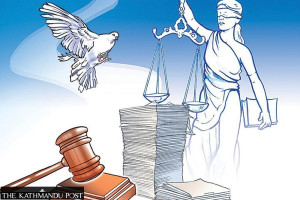Opinion
Lost in translation
The term ‘republic’ in Nepal pertains mainly to the symbolic sphere and makes dubious reference to the French Revolution
An empty word
It is worth noting, first of all, that most states (136 out of 193) in the world lay claim to this appellation. Among Nepal’s immediate neighbours within the Himalayan range, India, Pakistan, Bangladesh and China are officially referred to as republics. Pakistan is an Islamic Republic just as Iran, with both countries applying Sharia religious law; what is more, the latter is governed by a clerical figure. Today ‘republic’ does not therefore necessarily rhyme with secularism and does not inevitably entail a separation of religion from the political realm. Paradoxical as it may sound, it may even be synonymous with enduring religious sanctions in all sectors of life.
Furthermore, ‘republic’ does not necessarily imply freedom of press, uncensored internet, the separation of law from political power and egalitarianism. The People’s Republic of China and the Socialist Republic of Vietnam, neither of which are regarded as fully democratic regimes, can be mentioned in this respect. A republic, which theoretically implies ‘the appropriation of the power by citizens’, can even exist alongside a single-party system and the rule of a minority. A republic can therefore become a dictatorship. And lastly, democracy and kingship are not mutually exclusive. The United Kingdom is a vivid example of a
parliamentary kingdom, which is well-known for its deep-seated democratic political tradition.
Consequently, the term republic means little on its own today. It is an ‘empty word’, changing its definition according to each state’s history and its particular political physiognomy. There are as many republics as so-called republican countries. What is more, republicanism is not ipso facto synonymous with good governance. It does not preclude excess power on the part of one party or social class and
the use of state power for the exclusive benefit of politicians. In other words, Homo republicanus has become a mythical creature.
Nevertheless, the term prevails and is constantly referred to in an almost sacred manner in France (‘Freedom, Equality, Fraternity’ is the French Republic’s motto) as well as in the US. The massive rally on January 11 in Paris after the terrorist attack on Charlie Hebdo was commented on by several observers as being a vivid effusion of a grassroots republican spirit beyond any class, religion, or other forms of belonging. As far as Nepal is concerned, authorities have more importantly decided to associate this term with the adjective ‘democratic’ (lokatantrik). This has changed everything, paving the way for a particular type of outward-looking republic associated with freedom and a balance of power. The path is, therefore, open to a constructive and inclusive political regime.
Roman, Italian models
Two main types of historical models stand out. The ancient Roman pattern at work for centuries immediately before and after CE is said to be the original system. The word ‘republic’ itself comes from the Latin res publica (public matter) that is, common interest. It used to designate a non-monarchical regime, where political leaders were not chosen by hereditary rule but through recurring elections. The emphasis was on civic virtue and public concern. It was in fact an oligarchy controlled by the main patrician families of the Roman state. As in the ancient Greek democracy, women and slaves were prohibited from voting. The French Republic, proclaimed in 1789 after the Revolution, was plainly inspired by this Roman model but in a different democratic, egalitarian, secular manner. Yet, it took some time for a complete distinction between the republic and the monarchy (or empire) to be enforced. In 1804, Napoleon Bonaparte declared himself the Emperor of the French Republic.
The second, lesser-known model flourished in the tumultuous mediaeval cities of the northern and central Italy (Sienna, Florence, etc) from the 12th century onwards. This was based on the communal autonomous power of small cities that wielded authority over the surrounding countryside. Power lay mainly in the hands of aristocratic families, priests and populo grasso, affluent traders, gathered together in advisory councils and assemblies. This system was based on township and was greatly opposed to the seigniorial system that was synonymous with autocracy. Though based on royalty, the small medieval Malla kingdoms of the Kathmandu Valley (especially Lalitpur with its Pradhan kingmaking) are reminiscent of this system. Aside from the king’s authority, they devolved some powers to the local people. In 1871, the revolutionary commune of Paris resuscitated this ancient ethos of self-governing bodies in a much more radical and populist form. In her writings on politics, the philosopher Hannah Arendt emphasises this grassroots system based on deliberating councils as well as on the people’s almost full and direct participation. For her, such a paradigm of non-dominance and freedom is a precondition of democracy and the lost paradigm of republicanism.
Symbolic connotation
In my opinion, the choice of the word ‘republic’ in Nepal in 2008 pertains mainly to the symbolic sphere. As emphasised at that time in some newspapers, it makes (dubious) reference to the French Revolution and to the subsequent creation of the French Republic. It was defined primarily in opposition to the monarchy. Urgency lay in removing an unpopular king and in restoring a parliament at the heart of governance. The rest—that is, the devolution of power to the people, the core of republicanism—is still rather vague. The creation of a new regime represented a violent rupture in the terminology. The problem is that the code of rights and duties, which is vital for a republic, has not yet been adopted. Furthermore, Parliament has so far remained an extremely weak institution that is unable to lay down the law of the land. “Words, words, words,” as Shakespeare says (‘Hamlet,’ 2.2). It is not that easy to give substance to the terms used. The building of a ‘Democratic Republic’ (Loktantrik Ganatantra), still has a long way to go.
Toffin is Research Professor at the National Centre for Scientific Research, France




 20.12°C Kathmandu
20.12°C Kathmandu









